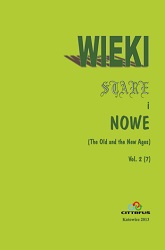Generał Stanisław Szeptycki jako dowódca wojsk polskich w latach 1919—1922 wobec północno-wschodnich i południowo-zachodnich kresów Rzeczpospolitej
Lieutenant Stanisław Szeptycki as a commander of Polish army between 1919 and 1922 and the north-eastern and south-western borderline of Poland
Author(s): Sylwester FertaczSubject(s): History
Published by: Wydawnictwo Uniwersytetu Śląskiego
Summary/Abstract: Describing the attitude of lieutenant Stanisław Szeptycki, as a commandeer of different units of Polish army in a Polish-Bolshevik war, especially as a commander of the North-Eastern Front, to the eastern borderline of the Republic of Poland it can be said that his approach did not differ from the opinions presented by the majority of independent activists at that time. Szeptycki’s generation fought for such a Poland — in a territorial sense — which was erased from the map of Europe in the 18th century. They simply did not know another Poland. Such an image was provided to them by their ancestors, they learned about such a Poland and it was in their hearts. So why did they require to include Silesia into Poland which was eliminated from the Polish nation a long time ago? They believed that the nation will be weak without a serious economic base (a gold apple in the Polish crown, as Szeptycki used to say about this land) Upper Silesia could constitute for the Republic of Poland and the lack of access to the sea. The question that arises is whether lieutenant Szeptycki was not afraid of the fact that a big number of ethnic minorities in a young nation, aware of their separateness could weaken the nation and be the cause of internal fears. It seems that the lieutenant did not voice such fears. He himself was brought up in a family home in the culturally-diversified environment, in the Russian area, learned and served in the army in a multinational dualistic Austro-Hungarian monarchy which he treated his political homeland till 1918 and was certain that a reborn Polish nation could be such a homeland for its loyal citizens other than the Polish nationality.
Journal: Wieki Stare i Nowe
- Issue Year: 7/2010
- Issue No: 2
- Page Range: 58-73
- Page Count: 16
- Language: Polish

